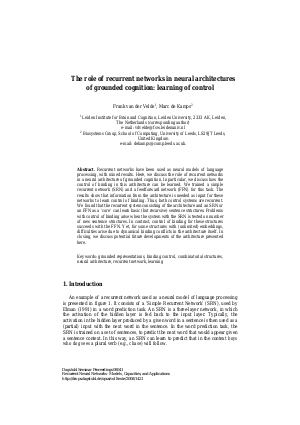The role of recurrent networks in neural architectures of grounded cognition: learning of control
Authors Frank Van der Velde, Marc de Kamps
-
Part of:
Volume:
Dagstuhl Seminar Proceedings, Volume 8041
Part of: Series: Dagstuhl Seminar Proceedings (DagSemProc) - License:
 Creative Commons Attribution 4.0 International license
Creative Commons Attribution 4.0 International license
- Publication Date: 2008-04-15
File

PDF
DagSemProc.08041.6.pdf
- Filesize: 200 kB
- 18 pages
Document Identifiers
Subject Classification
Keywords
- Grounded representations
- binding control
- combinatorial structures
- neural architecture
- recurrent network
- learning
Metrics
- Access Statistics
-
Total Accesses (updated on a weekly basis)
0PDF Downloads0Metadata Views
Abstract
Recurrent networks have been used as neural models of language processing, with mixed results. Here, we discuss the role of recurrent networks in a neural architecture of grounded cognition. In particular, we discuss how the control of binding in this architecture can be learned. We trained a simple recurrent network (SRN) and a feedforward network (FFN) for this task. The results show that information from the architecture is needed as input for these networks to learn control of binding. Thus, both control systems are recurrent. We found that the recurrent system consisting of the architecture and an SRN or an FFN as a "core" can learn basic (but recursive) sentence structures. Problems with control of binding arise when the system with the SRN is tested on number of new sentence structures. In contrast, control of binding for these structures succeeds with the FFN. Yet, for some structures with (unlimited) embeddings, difficulties arise due to dynamical binding conflicts in the architecture itself. In closing, we discuss potential future developments of the architecture presented here.
Cite As Get BibTex
Frank Van der Velde and Marc de Kamps. The role of recurrent networks in neural architectures of grounded cognition: learning of control. In Recurrent Neural Networks- Models, Capacities, and Applications. Dagstuhl Seminar Proceedings, Volume 8041, pp. 1-18, Schloss Dagstuhl – Leibniz-Zentrum für Informatik (2008)
https://doi.org/10.4230/DagSemProc.08041.6
BibTex
@InProceedings{vandervelde_et_al:DagSemProc.08041.6,
author = {Van der Velde, Frank and de Kamps, Marc},
title = {{The role of recurrent networks in neural architectures of grounded cognition: learning of control}},
booktitle = {Recurrent Neural Networks- Models, Capacities, and Applications},
pages = {1--18},
series = {Dagstuhl Seminar Proceedings (DagSemProc)},
ISSN = {1862-4405},
year = {2008},
volume = {8041},
editor = {Luc De Raedt and Barbara Hammer and Pascal Hitzler and Wolfgang Maass},
publisher = {Schloss Dagstuhl -- Leibniz-Zentrum f{\"u}r Informatik},
address = {Dagstuhl, Germany},
URL = {https://drops.dagstuhl.de/entities/document/10.4230/DagSemProc.08041.6},
URN = {urn:nbn:de:0030-drops-14213},
doi = {10.4230/DagSemProc.08041.6},
annote = {Keywords: Grounded representations, binding control, combinatorial structures, neural architecture, recurrent network, learning}
}
